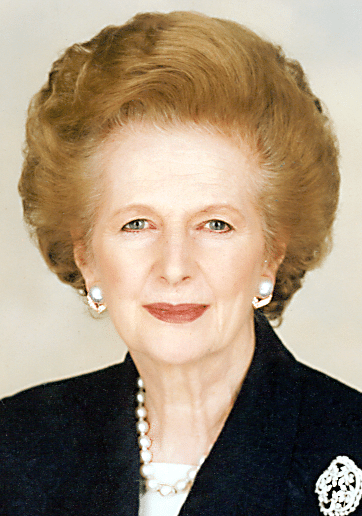
Margaret Hilda Thatcher, was born on October 13, 1925, in Grantham, Lincolnshire, England to Alfred Roberts, a grocer, and Beatrice Ethel Stephenson. She enrolled at the University of Oxford’s Somerville College in 1943, specializing in X-ray crystallography. Margaret graduated in 1947 with a second-class degree in chemistry. After graduation, she worked as a research chemist and later trained as a barrister before entering politics. She became a Member of Parliament (MP) for Finchley in 1959, representing the Conservative Party.
Thatcher gradually rose through the ranks of the Conservative Party and became the leader of the party in 1975. In 1979, she was elected as the first female Prime Minister of the United Kingdom, a historic achievement. Her time in office, from 1979 to 1990, was characterized by a series of economic and political reforms, earning her the nickname “The Iron Lady.” The Thatcher government implemented conservative policies, including privatization of state-owned industries, deregulation, and a strong stance against labor unions.
In 1982, Thatcher displayed a firm resolve in the Falklands War with Argentina that boosted her popularity. She also had a close working relationship with U.S. President Ronald Reagan, and together, they advocated for conservative economic principles and against communism during the Cold War.
While Thatcher was a polarizing figure, and admired by many conservatives for her strong leadership, she faced significant opposition and controversy during her time as Prime Minister. This opposition resulted from her handling of economic policies, social issues, and the poll tax. In 1990, following internal party disputes and dwindling support, “Maggie” Thatcher resigned as Prime Minister and was succeeded by John Major. Her resignation marked the end of an era in British politics.
After leaving politics, Thatcher wrote her memoirs and remained active in public speaking and engagements. She was awarded a life peerage as Baroness Thatcher of Kesteven and took a seat in the House of Lords. In 2005, Thatcher’s daughter, Carol, announced that her mother was suffering from dementia, and 8 years later, on April 8, 2013 Margaret Thatcher passed away. Her legacy is a subject of ongoing debate. While she is celebrated by some for her economic policies and strong leadership, she is also criticized for the social divisions that emerged during her time in office. Her tenure had a profound and lasting impact on the political landscape of the United Kingdom.
Margaret Thatcher’s life and career have left an indelible mark on British and global politics. She remains a prominent and influential figure in the history of the United Kingdom. The belief underpinning her rise from humble beginnings as the daughter of a grocer to her status as the first female Prime Minister of England is captured in her assertion, “People think that at the top there isn’t much room. They tend to think of it as an Everest. My message is that there is tons of room at the top.”
